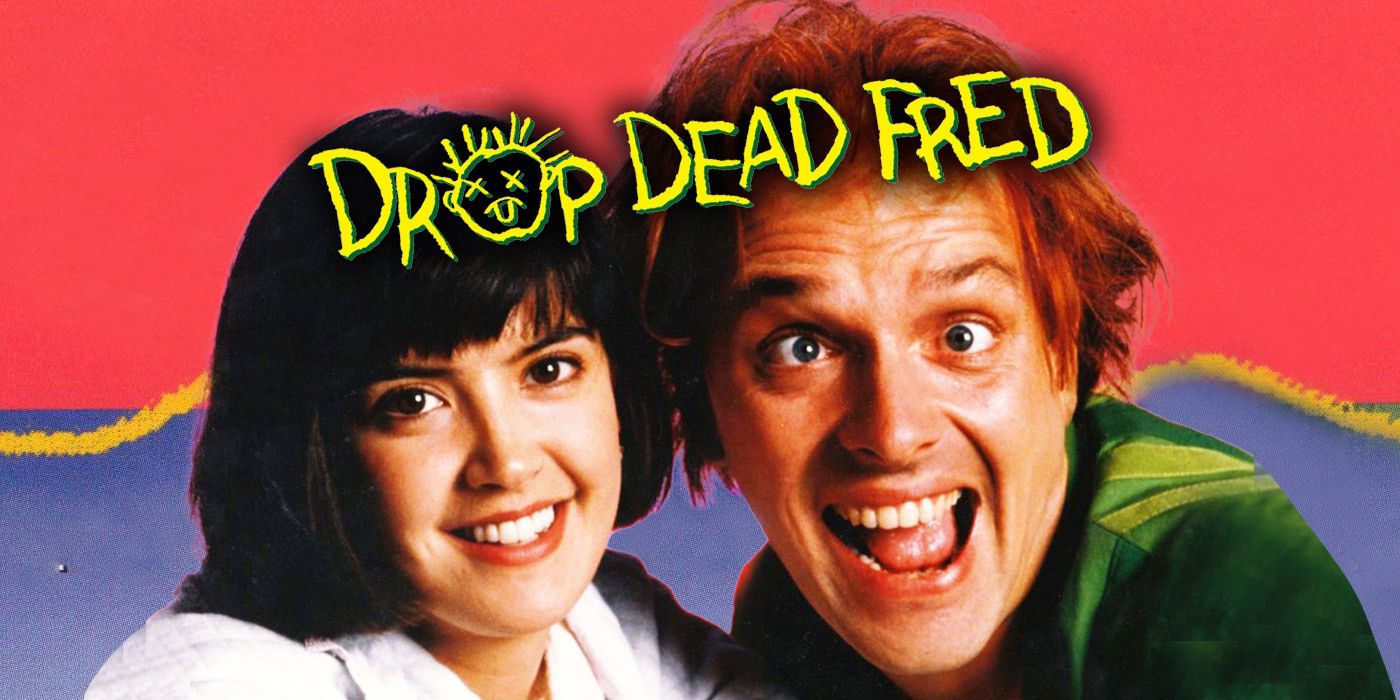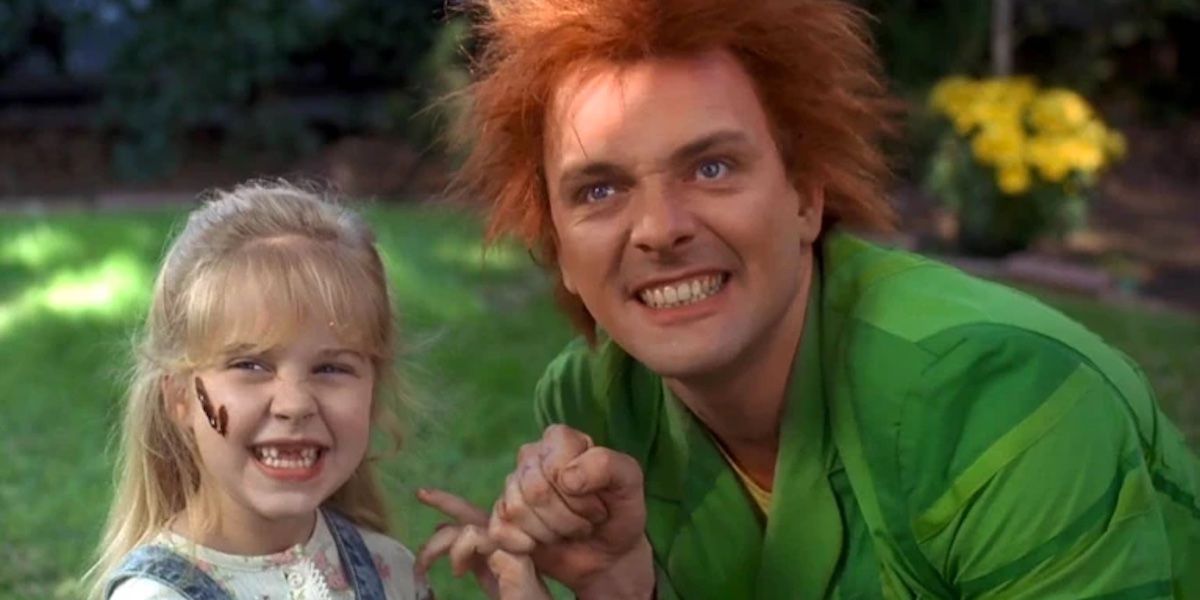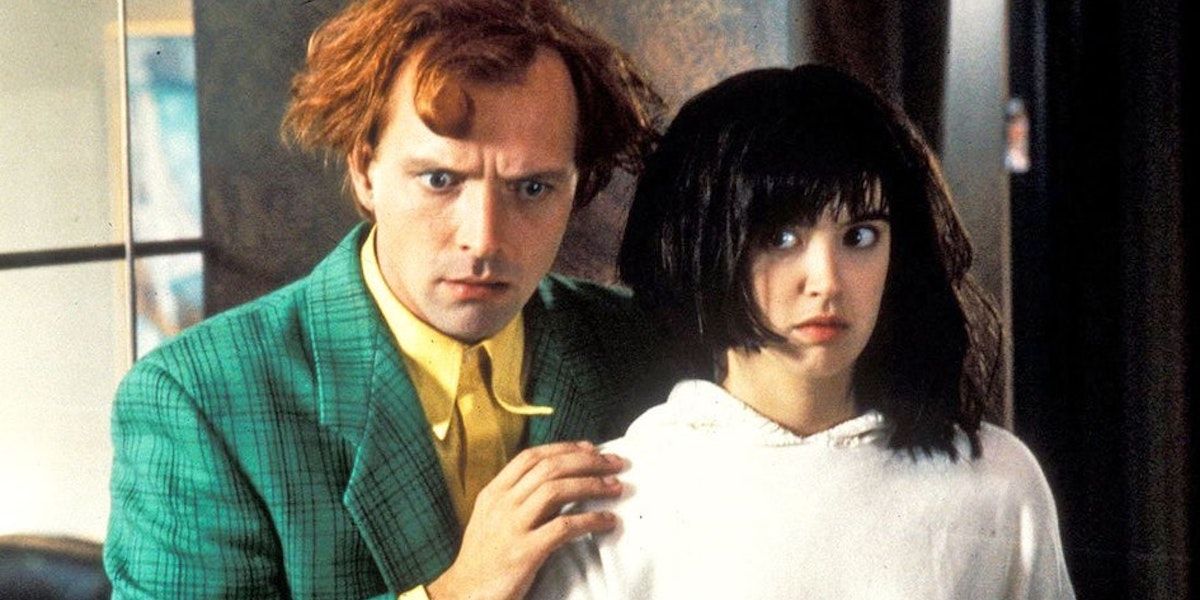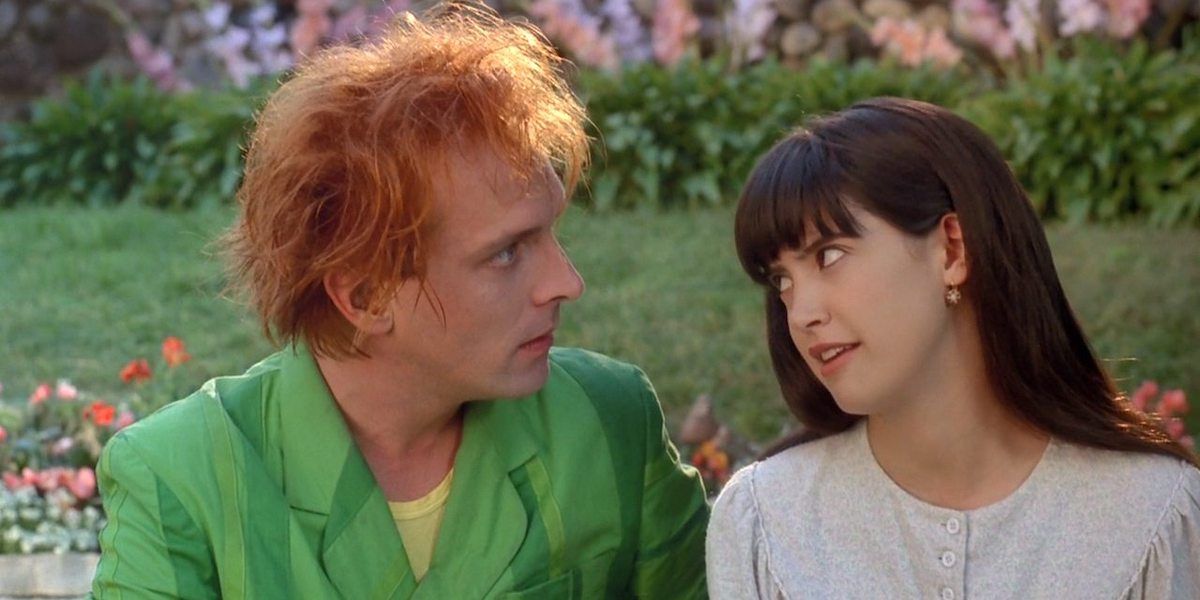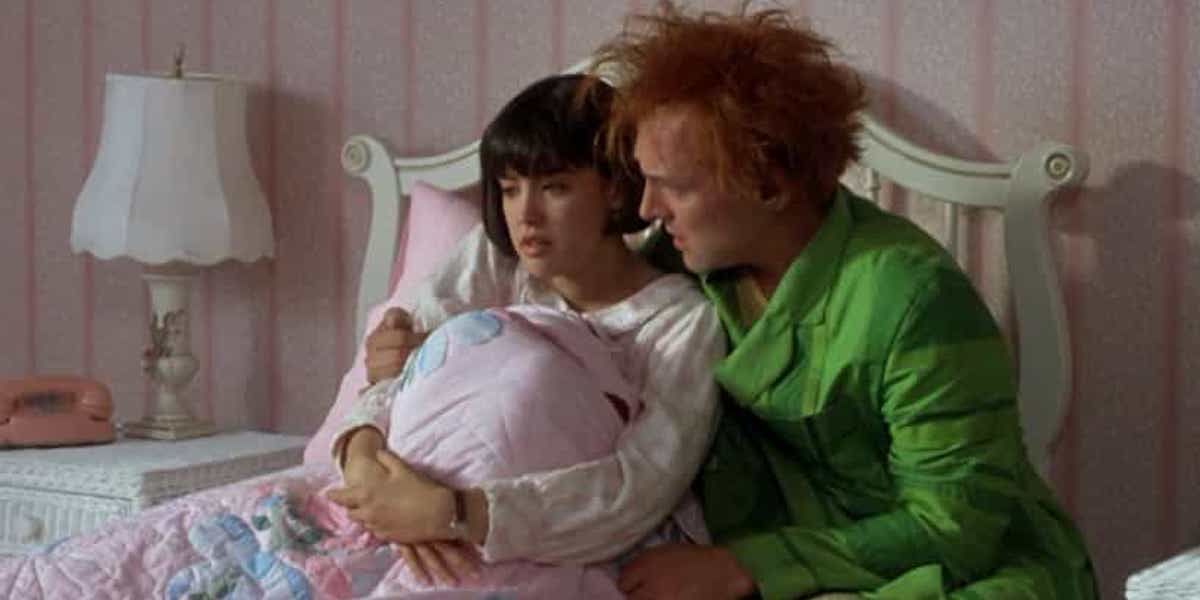Many kids of the ‘90s remember the raucous charm of Drop Dead Fred with fondness: to a young viewer, it was all the wacky Nickelodeon-style fun that a kid could want from a movie. Adults (or more specifically, critics) couldn’t have hated it more if they tried. Gene Siskel proclaimed it one of the worst movies he had ever seen, and anyone who enjoyed it as a kid probably recalls their own parents finding it thoroughly annoying. With the eccentric comedy stylings of Rik Mayall playing a central role, it seemed destined to be either loved or hated. It is possible however that both adults and kids may have been too distracted by the loud antics to recognize the truly heartfelt look it takes at the long term effects of abusive childhoods.
Elizabeth (Phoebe Cates) is a meek thirty-something who finds herself ill-equipped for the pressures and complex relationships of adult life. Her sleazy husband Charles has left her for another woman, so her overbearing mother Polly (Marcia Mason) drags her back to her childhood home where she plans to overhaul her daughter’s life. When Elizabeth finds her old jack-in-the-box in her bedroom, she rips open the tape keeping it shut, and unleashes a figure she had almost forgotten about, her imaginary friend Drop Dead Fred (Rik Mayall). He sets about causing havoc in her life, with the ultimate intention of being the support system she desperately needs and easing her into a happy, independent adult life.
As a grownup, Elizabeth is completely lost. She wears long frumpy dresses and ankle socks, a stark contrast to the slinky figures and LBDs of the women her estranged husband flirts with. She drives a beat-up old car, which she loses, along with her money, husband and job, all in one lunch hour. Her friend Janie (Carrie Fisher) tries to inject some mindfulness into her life, while her mother and husband infantilize her. She is like an abandoned child, wandering helplessly through life. Upon dismissal from her job, she trips over a briefcase left in her way - a fun little metaphor for how poorly she fits in the adult world - and into the arms of childhood friend Mickey, who takes a liking to her, and tries to get to know her.
Elizabeth, and by extension Fred, do not fit in the world she inhabits. While the camera sweeps up the stockinged legs of a sexy woman at Charles’ car lot, he has all the charm and hairsprayed perfection of… well, a car salesman. His apartment is furnished with art nouveau, and he attends fancy wine-tasting parties where he blends into the sea of black tie. Fred’s signature color is bright green, topped with a shock of orange hair, so he really stands out in this world of white and cream, and in mother’s cushy but comfortless Laura Ashley fantasy. Even when Elizabeth makes an effort to look chic for the wine party, she chooses bright purple, and simply doesn’t blend with the bar full of little black dresses.
Fred is a manifestation of Elizabeth’s unhappiness. He explains to her that he is stuck here until she is happy again - something she feels she can only achieve by getting Charles back. At first, it seems that she chases her husband simply because she loves him so much she is willing to overlook his indiscretions, but the more he proves himself to be a bad guy, the closer Elizabeth comes to acknowledging that she fears being alone. She is a fearful woman, whose experiences in childhood stop her from respecting herself enough to be alone. Indeed, the opening shot of the movie communicates this with a close-up of a single goldfish swimming around a naked bowl - no pebbles, no plants or treasure chests. Just glass and water. Elizabeth is terrified of being the fish in that bowl, never realising that she is exactly that when she is in the company of people who only want to bring her down.
Key events in Elizabeth’s troubled childhood are shown through flashback. First comes a nighttime incident in which she and Fred play burglars, prompting her parents to call the police (notably, without checking on their daughter while there are supposedly intruders in the house). Her father ends up getting arrested, while her mother shrieks about what the neighbors will say about these “pillars of the community” getting into legal trouble. Then, a morning of mud pie-making pushes her mother over the edge, at which point she realizes that Fred ‘lives’ in the jack-in-the-box, which she tapes shut, warning Elizabeth that if she dares to touch it again, it will be thrown in the garbage and Fred will be crushed to death. In the midst of all this emotional abuse towards a five-year-old, the father tries to defend his daughter, but finds himself to be no match for his cold bitch of a wife, and storms out, apparently never to return. The child has lost everyone all at once, and in a desperate attempt to fix what she feels she caused, she starts cleaning up the mud pie mess in silence.
Elizabeth recounts these events in conversation with Fred, which swiftly becomes a sort of therapy session. He helps her come to conclusions about why she is the way she is just by listening to her and offering her support. She realizes that by allowing her mother to see her upset and vulnerable, she effectively gave the matriarch a power over her, to the point that Elizabeth put up an emotional wall, determined never to seem vulnerable again. Problem is, she has carried that over into her adult relationships, and it has the exact opposite effect: her lack of gumption or presence merely allows others to walk over her. It’s the reason that Charles continues to string her along, it’s the reason she loses her job despite there being no real grounds for termination.
Mother is a key character, whose portrayal by Marsha Mason is given more depth than one might expect. She is a stern, preened woman who struts around looking like a Mary Kay consultant in power suits and heels. The things she says to her daughter, both as a child and an adult, are downright cruel; the incident with the jack-in-the-box proves that she gets a sense of satisfaction from making her daughter fearful. What sort of a person tells their small child that they “don’t love you as much as I used to”, and directly blames the child for her own broken family? This character could easily have been the pantomime villain, but director Ate de Jong allows her little moments of her own emotional vulnerability. The camera often lingers for a few seconds after the scene ends, focusing on the mother, who looks pensive, saddened, perhaps even guilty. When Elizabeth finally finds herself, mother’s character flaws are exposed: “Don’t you dare walk out on me,” she challenges, before letting her mask slip, and practically begging, “I’ll be lonely”.
This line really hammers home the idea of generational trauma. All this time, mother’s fear of being alone drove her to be tough, domineering and controlling of her daughter, whereas for Elizabeth, it meant being submissive and keeping her head down. Through her own insecurities, mother produced a broken person who is in one way exactly like her, and in another the exact opposite. She is not a one-dimensional villain who’s mean because she is just mean; she clearly has her own swamp of fears and anxieties that she doesn’t process in a healthy way, causing a domino effect on those around her.
Elizabeth’s arc, of course, is to come to terms with herself, to find her worth and pursue life without the many anxieties that have riddled her since childhood. The final minutes of the movie descend into a Burtonesque dream world, where the home takes on a warped, almost cartoonish skew, and Elizabeth faces her fears (incidentally, Tim Burton turned down this project; it is fun to think of how it would have turned out under his guidance). Fred tells her that his time with her is up, that “you have you now, you don’t need me”, and she hugs him one last time, before he vanishes, and her arms close around herself. She finally embraces her own being, she truly does have herself, and there is a tangible sense of relief, of comfort.
Phoebe Cates is so good in this role. Her cute, wide-eyed face already makes her the perfect deer in the headlights, but she brings true emotion to Elizabeth that is really touching. During her ersatz therapy session with Fred, she is overcome with grief, and sobs her heart out, telling him “all the life and spirit and ‘Fred’ went out of me”. And despite Fred’s disdain for any soppy outpourings, he doesn’t burst into any wacky hijinks; he listens to her, he really cares. And while Mayall covers most of the obvious comedy, Cates handles invisible slapstick with finesse. In a particularly amusing scene in which Fred sabotages her lunch with Mickey, she desperately tries to cover his antics. He forces her to pour a glass of water into her lap, to swing her arms, to throw her meal, and her painful attempts at styling it out are wickedly funny. In her own understated way, she is a real dab hand at comedy.
Rik Mayall is an icon of English comedy, but his style is an acquired taste. His sitcoms The Young Ones and Bottom characterized his brand of humor: hyperactive, loud and totally uninhibited. Some might say obnoxious. In this way, he is the perfect Fred. He embodies childish naivete, everything that is gradually beaten out of the average adult; to Elizabeth, he is an uncomfortable comfort, one she describes as her “best friend, but I’m scared to death of him”. Just as his presence coincides with her misery, it represents a frame of mind that is all too relatable, in which one feels unable to leave a bad situation because the familiarity of it offers a degree of stability. Taking the plunge into the unknown is Elizabeth’s ultimate fear, and it is Fred’s job to get her to that point.
What is Drop Dead Fred? Perhaps one of the issues it experienced upon release was that despite being marketed as a comedy, it wasn’t one really. Sure, there are some witty throwaway lines, and one or two sequences that are very amusing, but the majority of the ‘comedy’ is Rik Mayall’s performance. Fred is totally childlike, which is why his company is so great for young Elizabeth, and so jarring for adult Elizabeth. It’s not really about him being funny, it’s about him being the carefree influence that Elizabeth needed in childhood, and needs again now. It’s supposed to be relatable, and tell an emotional story; for all its rampant silliness, Drop Dead Fred actually shows “great sophisticatedliness”.

